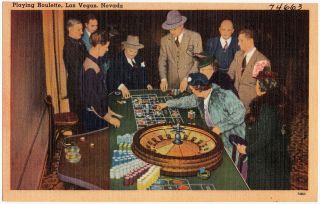
Several years ago, at Monte Carlo, I watched a giddy woman decked in pearls and diamonds winning all evening at the blackjack table, ultimately collecting stacks of chips worth almost 8,000 euros. At midnight, as if a pumpkin carriage were waiting, she announced that she had to leave.
She played her entire pile of chips and, within two minutes, lost. She tipped the croupier and left with a carefree joy that she had exhibited all evening. A young man sitting next to her hit blackjack several times, and when he did, his head would roll back. His eyes would lift above his lids in a swoon.
Another gentleman played several hands of blackjack at once, consistently winning almost every time. Why didn’t he go to the utterly private rooms, where Saudi princes play with a limit and without being seen? Because he wanted to be seen.
Of course, these are gamblers who likely can afford to live with losses. Others looked as if not in possession of enough wealth to play at any of the Monte Carlo tables. One woman appeared as if possessed by Fortuna as she played six slot machines at once, never waiting long enough to watch any of the reels stop.
Not every passionate gambler is a gambling addict; we should consider the distinction between problem gambling and gambling addiction, as Mark D. Griffiths has in his post Problem Gambling vs. Gambling Addiction. Yet, I have seen so many gamblers whose lives have been damaged by the gambler’s illusion that someone must win and that the odds of a win are within reach.
Old Theories
Gambling has always been with us, but to appreciate the illusion, let’s go back to a time roughly in the late 19th and early 20th centuries when theories of psychology did not distinguish between neurotic and social or entertainment gambling. Those theories were based on assumptions that human behavior relates to subconscious mental activity and memories of hereditary transmission of neurotic tensions stored in the id.
Challenging the id is the superego, holding parental reproaches, moral censorship, and cultural conventions. The ego is a mediator for the conflict. As Freud saw the conflict, it was a battle between the id and the superego, a tension between the conscious and the ego’s performance in dealing with an individual’s feelings of guilt and anxiety.
Sensation-Seeking
These days, gambling problems and addictions are viewed differently and somewhat more simply. Some behavioral psychologists believe that gambling addiction is reinforced by a driving need for stimulation propelled by a self-medicating means of coping with boredom, or possibly anxiety, insecurity, and low self-esteem. Others believe that betting, rather than winning, is an emotional high.
Watch gamblers at the start of a race; they are euphoric seconds before the start. The closer to race time, the higher the euphoria.
The woman in pearls and diamonds and the man winning in bliss are examples of people with feelings that clinicians would consider akin to cocaine highs, along with urges to take on bigger risks for greater excitement. For them, gambling is not entirely about money. Rather, it is the action, the rush.
Some people gamble for the escape, a numbing experience that reduces whatever mental discomforts they may have. For them, it is an escape from their routines that are replaced by recreation and amusement.
And there are still others who cognitively distort and deny reality in favor of superstition to enhance their control of luck and chance. They misrepresent odds and brand particular numbers as lucky.
Research
The most recent PET scan research on gambling addiction suggests that pathological gamblers, alcoholics, and drug addicts have similar patterns of neural activity when exposed to their individual addictions. When neuroscientists looked at a particular group of neurons, they found that circuitry in areas associated with pleasure and addiction processing increases during activity.
That is the same area where information is received from the cortex about the satisfaction of fundamental human needs and comforts. By increased activity, dopamine is released to an area in the brain known to play a major role in reward, fear, laughter, and addiction. With increased dopamine reward pathways behaviors that favor, pleasure, reward, and punishment are reinforced.
Reasons for gambling obsessions are complex, as they are connected to the complexities of normal human behavior. There is still so much that is not known.
The trick is, as Griffiths points out in his wonderful piece, is that we must separate destructive behaviors from biologically necessary ones without purging the prudent delightful pleasures of life.
The striking thing about all those gamblers at Monte Carlo mentioned above, was that every one of them had a desperate, unhappy look, a forlorn look, as if they had just lost someone or something serious in their lives.